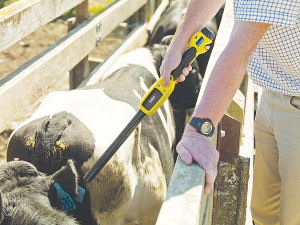Editorial: Happy days
OPINION: The year has started positively for New Zealand dairy farmers and things are likely to get better.
 MPI says it's important for farmers to do the right thing because biosecurity is critically important to the agricultural sector.
MPI says it's important for farmers to do the right thing because biosecurity is critically important to the agricultural sector.
A Hawera farmer is one of several farmers who has recently been convicted for failing to register his animals under the National Animal Identification and Tracing (NAIT) scheme.
Ross Gordon Clark was fined $20,000 in the Hawera District Court, after earlier pleading guilty to seven charges under the NAIT Act, for not registering 106 cows between May and July 2020.
Meanwhile, Waitui farmer Victor Charles McIntyre pleaded guilty to 19 charges under the NAIT Act and was fined $18,900 in the New Plymouth District Court for not registering 175 cattle between April and September 2020.
The Ministry for Primary Industries (MPI) has recently secured two additional NAIT convictions which are awaiting sentencing.
The NAIT scheme enables MPI to track and trace cattle and deer when they are moved between farms or for processing. It's a critical factor in our ability to act quickly and decisively in response to biosecurity threats that could have devastating effects for New Zealand.
In December 2019, Parliament increased the penalty for non-registration tenfold, meaning the maximum fine was increased from $10,000 to $100,000 and these fines are the first under the updated penalties.
MPI regional manager of Animal Welfare and NAIT Compliance Joanna Tuckwell says it's important for farmers to do the right thing because biosecurity is critically important to the agricultural sector.
"We certainly take it very seriously and the increase in fines shows Parliament does too. The higher penalties under the new regime reflect the seriousness of the situation," Tuckwell says.
"People in charge of NAIT animals need to get this right. When they don't they potentially put the whole sector at risk if a biosecurity matter involving farm animals was to occur."
The World Wide Sires National All Day Breeds Best Youth Camp Best All Rounder plaudit has become family affair, with 2026 Paramount Cup winner Holly Williams following in her sister Zara's footsteps.
DairyNZ is giving New Zealand farmers a unique opportunity to gain hands-on governance and leadership experience within the dairy sector.
Herd improvement company LIC has posted a 5.2% lift in half-year revenue, thanks to increasing demand for genetics.
According to the latest Fresh Produce Trend Report from United Fresh, 2026 will be a year where fruit and vegetables are shaped by cost pressures, rapid digital adoption, and a renewed focus on wellbeing at home.
The Roar is a highlight of the game hunting calendar in New Zealand, with thousands of hunters set to head for the hills to hunt male stags during March and April.
OPINION: The past few weeks have been tough on farms across the North Island: floods and storms have caused damage and disruption to families and businesses.